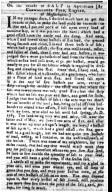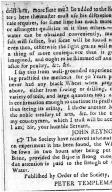[ On the Benefit of Salt in Agriculture ] Cadwallader Ford
Date: 1786/09/05
Source:
Nova Scotia Gazette and the Weekly Chronicle
Institution: Nova Scotia Archives
| Source Origin: Nova Scotia Newspapers on Microfilm
| Reference: Consult the Nova Scotia Archives' "Nova Scotia Newspapers on Microfilm" list (Royal Gazette) for a complete account of microfilm reels for this paper. EMMR includes recipes from Microfilm Reels 990, 8155, 8156, 8158, 8162
Instructions for sowing salt along with flax and other grain seed to increase yield. Vol. 16, No. 1065. Microfilm Reel 8162. The letter was also published in The Scots Magazine, Vol. 55, p. 72 (Edinburgh: Murray and Cochrane, 1793) and The European Magazine, and London Review, Vol. 23, p.88 (London, 1793).
On the benefit of SALT in Agriculture [By
CADWALLADER FORD, ESQUIRE,
of Massachusetts.]
IN my younger days, I studied much how to get the
benefit of salt, to make the land yield its increase: to
that end, I put one peck of salt upon every load of
meadow hay, as it was put into the barn; which had a
good effect upon the cattle and the dung. And once,
when I had sowed three bushels of flax seed, the ground
being smooth and clean, I sowed three bushels of salt;
which had a good effect: the flax was well coated, taller,
and fuller of seed, than I ever had any before; it was
judged there were 50 bushels of seed from the three acres,
which as flax seed sells now, at 5s. per bushel, would go
nearly to pay for all the labour which is required in dres-
sing and cleaning the flax. Since that, I have read, in
Mr. Elliot’s book of husbandry, of a gentleman, who sow-
ed a Piece of land with flax, and sowed salt upon
it at the rate of five bushels per acre, except a
strip through the middle: the effect was that where the
salt was sowed there was tall, good flax; but the strip
which had no salt was poor and short, and good for little.
I judge that five bushels of salt to the acre was too much
for the benefit of the land; but, being called off from hus-
bandry to attend other affairs, I left the care of my farm
with my sons, who used no salt until last spring, A. D.
1785. The land being very wet and miry, till near the
latter end of May, we sowed one acre of flax, and after
it was come up near a finger’s length, we sowed a bushel
of salt upon it, which had a good effect; the flax grew
well to a good height, but we had not quite ten bushels
of seed, owing, as I conceive, to the unfriendlyness of
the season. There was none of my neighbours, for two
miles round, that had any that would much more than
pay for pulling: therefore whenever you sow flax seed,
be sure to sow double the quantity of salt to your seed,
and you will have a good crop, if the season suit.
I advise all to make the experiment, and try a glad in
your oats, and even your winter rye, and all sorts of
grain that you sow, and even your Indian corn, at the
rate of two bushels of salt to an acre. You may depend
upon it, that every bushel of salt sowed, will produce
you more than five times the price of the salt; and, per-
haps, ten times so much.
Download: Transcription | Images

